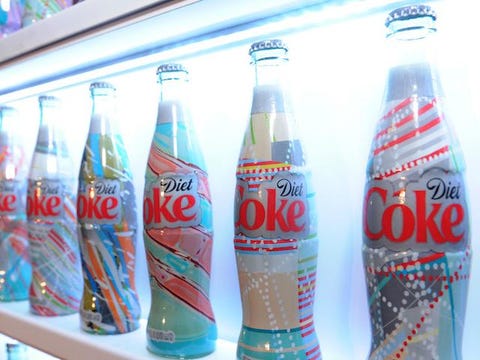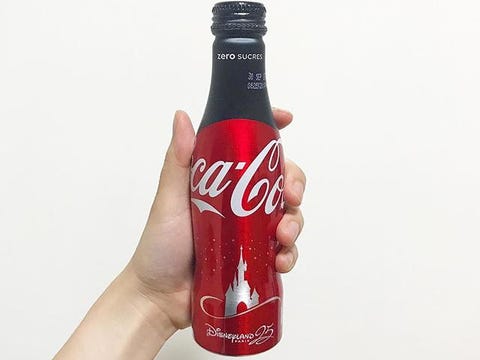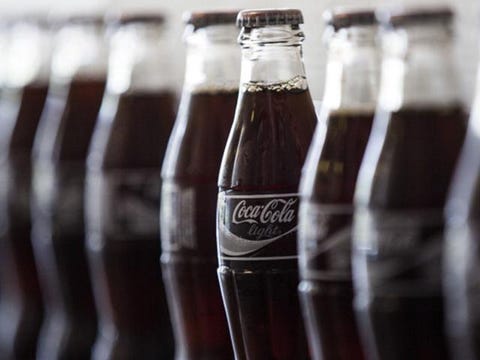Diet Coke Weight Loss Plan
Picture the scene: lunch has come and gone and, in offices across the land, Tupperwares once home to prepped-ahead sweet potato, chickpeas and spinach lie empty.
The temptation to attack the tub of M&S mini brownies is oh-so real. But rather than blow a few hundred calories on a handful, women nationwide reach instead for 'guilt-free' cans of chemically sweetened carbonated liquid. Are they hypocritical self-saboteurs for following healthy, totally 'grammable meals with a diet fizzy drink? Perhaps – which makes it all the more tricky to admit I am one of them. A health writer who knows her nutrition - and should know better - but can't get enough of the stuff.
Another is journalist Georgia Scarr. Glance at her Instagram and you'll see all the healthy-girl hallmarks. Bird's-eye view of eggs atop kale and roasted vegetables? Check. One lithe, toned body contorted into impressive yoga positions? Check again. But one lifestyle ritual that doesn't make the edit is her diet cola habit.
'I have a sweet tooth, but I don't make a habit of eating junk food or sugary snacks,' she says. 'I monitor my calories, and I want them to be filled with something more nutritious than sugar. So if I can get that sweet taste via a calorie-free fizzy drink, that is kind of a win/win.'
The enduring appeal of calorie-free fizzy pop might jar with the current 'it's a lifestyle, not a diet' healthy eating zeitgeist. But Jane Ogden, professor of health psychology at the University of Surrey and author of The Psychology of Eating, isn't surprised.
'So-called "diet" drinks still appeal because, though people may package it as "eating well" or "looking after yourself", many of us are essentially still dieting.' And while our goals are more rippling abs than thigh gap, she is right in that the majority of us want to keep our body fat low.
The problem with diet drinks
'The word "diet" carries powerful connotations of being lean, healthy and in control,' Professor Ogden adds. 'So while we continue to aspire to those things, "diet" labelling will draw us in – even if we'd rather not admit it.' Put in those terms, our fondness for diet drinks doesn't seem so outdated.
But are diet drinks actually helpful when you're trying to get – and stay - lean? Bosses at Slimming World appear to think so. The organisation (which has over 900,000 members in the UK) classifies diet colas as a 'free' food – along with water and green vegetables – meaning that its members don't have to track the amount they consume. But when you take a look at the evidence, this permissive attitude to drinks sweetened with chemicals such as sucralose and aspartame could be unhelpful.
In one study, published in the American Journal of Clinical Nutrition, scientists found that participants who drank one litre of a diet fizzy drink daily gained 1.5kg after six months. The group who drank full-sugar soft drinks gained 10kg, so the diet option had less of an effect. But, if researchers were adding zero calories and zero sugar into their daily diets, why did the participants gain any?

Getty Images
SO... IS IT ACTUALLY BAD FOR YOU?
As it stands, there is no evidence-based answer. But Robert Lustig, professor of endocrinology at the University of California and leading anti-sugar campaigner, has a possible explanation – essentially that consuming artificial sweeteners can significantly alter your biochemistry and predispose you to gaining fat.
'The diet soft drink group gained weight not because they were increasing their calories, but because they increased their levels of insulin,' he says. Made in the pancreas, insulin is a hormone that allows your body to use sugar (or glucose) from carbohydrates in the food you eat for energy – or store it for future use. 'We know that the more insulin you have in your blood, the more calories you will store as fat,' adds Professor Lustig. 'So anything that makes your insulin go up will make you gain weight.'
Because they don't contain any actual sugar, artificially sweetened drinks shouldn't spike insulin. But in one study in the journal Diabetes Care, researchers split their study participants in two groups and supplied half with a diet soft drink. They then tested their glucose and insulin levels afterwards, and found 20% more insulin in the blood of those who'd had drunk the fake sugary drinks.
Why? It's all down to the fact that the body is primed to detect sweetness. So, when something sweet hits your tongue, specific receptors send messages throughout your system.
'First, they send a message to the brain to say that sugar is coming. Then the brain sends a message to the pancreas telling it to expect the sugar, so it prepares to release insulin,' explains Professor Lustig.
But when you drink an artificially sweetened drink? The sugar never comes and the pancreas sends out the message that you need to seek out more glucose.

SUGAR VS SWEETENERS
Yasmin, 25, drinks several cans of diet cola weekly to help her stick to a 'no-sugar lifestyle'.
'I eat healthy fats through things like almonds and avocado - and I don't count calories. I love having a can of diet cola because it means I can have the sweet taste without consuming any actual sugar.'
Down two stone, wearing jeans for the first time in years – and hitting the gym for strength and cardio sessions four times a week – Yasmin is confident that she will be keeping to her method. 'If these drinks help me stick to a plan that is definitely working for me, I don't see it as a problem with it.' Professor Lustig warns that Yasmin may be making life hard for herself.
'Drinking artificially sweetened drinks when you're not eating actual sugar is self-defeating,' he says. 'The point of a "no-sugar lifestyle" is to de-sensitise yourself to sweet foods, but if you are regularly consuming sugar-free fizzy drinks then you are re-sensitising yourself daily.'
Indeed, researchers at the University of Sydney found that adding artificial sweeteners to the diets of rats and flies resulted in an 'imbalance in sweetness and energy'. After the brain realised it had the sweet taste without the dense calorie load it was expecting, it sent signals encouraging the animals to eat more – so it could reap the energy it had anticipated.
'What's more, consuming the sweetener regularly actually increased the intensity of the natural sugary taste,' says study author Dr Greg Neely. 'So this increased the overall motivation of the animals to eat more.' But, as before, more research – in humans – is needed.

THE VERDICT?
There is still much we don't know about how artificial sweeteners are linked to disease risk, too.
While a recent study did show that people who drank diet drinks had an increased chance of developing cancer or strokes, lead author Dr Matthew Pase cautions that this is early observational research – so it is impossible to tease apart cause and effect.
As for the claims that sweeteners such as aspartame could be cancer causing? 'The balance of evidence is that artificial sweeteners are safe for us to eat,' says clinical dietitian Rick Miller. 'Some small experiments on mice demonstrated a link between aspartame and the growth of cancerous tumours – but it is not clear if we can directly relate these results to humans.'
Miller's message for us habitual drinkers: don't freak out, but do cut down – on all colas.
'Regular and diet varieties contain phosphoric acid, which research suggests can reduce bone mineral density,' he says.
And let's be clear – a stress fracture caused by weak bones is going to have a more detrimental impact to your aesthetic and athletic goals than a few mini chocolate brownies.
Still, I can't promise that I will have developed willpower of steel and won't have had a sneaky sip of my old poison by the time you have read this. But if I do choose to crack open a can, it certainly won't be done mindlessly. Because, while a part of me may still be sold on the zero-sugar, zero-calorie promise, there is a big chance that my body is not.

HOW TO BREAK THE HABIT
Ready to consciously uncouple with your fizzy vice? Follow these three R's.
RECOGNISE
'Next time you're craving a fizzy diet drink, think about the context in which you drink it. Do you really want what is in the can or, instead, do you just want some fresh air - or some time to pause?' says Ogden. Nail that, and you'll be more able to see what you need - and one step closer to getting it.
REMEMBER
Think of your parting ways with artificially sweetened soft drinks like that awful break up with your shitty ex. 'You'll feel like you're missing something, but it is not because you don't have something that you need - you were fine before. You feel like this because you created a space for something and it's not there anymore.'
REPLACE
That space needs filling will something else, but don't expect tap water to effectively plug the gap. 'Brew a herbal tea, or infuse a jug of water with chopped cucumber and mint,' suggests Miller. 'Or give your body a dose of essential antioxidant vitamins - and sustaining fibre, which if you're getting hungry between meals, you probably need.' Straws at the ready.
You won't believe this. I Quit Diet Coke For A Month - Here's What Happened.
This content is created and maintained by a third party, and imported onto this page to help users provide their email addresses. You may be able to find more information about this and similar content at piano.io
Source: https://www.womenshealthmag.com/uk/food/healthy-eating/a707039/diet-coke-habit/